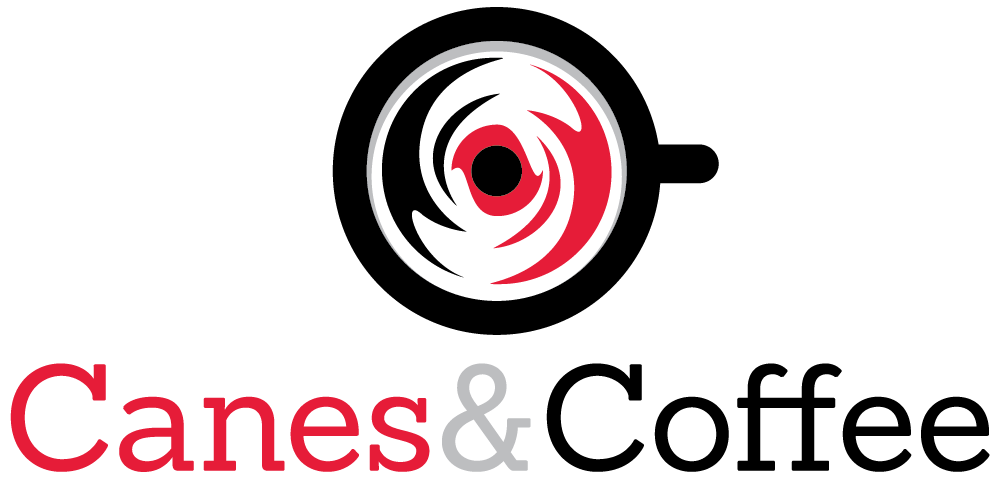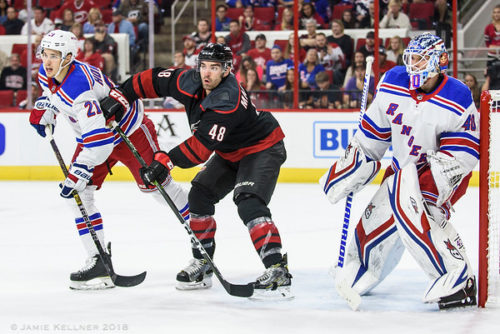Yesterday’s Daily Cup of Joe had a brief, initial look at the Carolina Hurricanes 2020-21 season from a team perspective.
The 2020-21 NHL schedule will feature four newly-minted divisions and a 56-game season played entirely within those divisions. Also unique will be a season featuring mostly two-game sets played between two teams in the same location with the goal of minimizing travel and hotel switch overs. The combination of new divisions, only divisional play, a 56-game season and the two-game sets will make the 2020-21 schedule significantly different than prior years in four ways.
Today’s Daily Cup of Joe considers the possible impacts of those four schedule changes.
The new division
The Hurricanes are in an interesting division that features a mix of previous Eastern Conference and Western Conference teams. Representing the Eastern Conference are the Florida Panthers, Tampa Bay Lightning, Columbus Blue Jackets and Carolina Hurricanes. Representing the Western Conference are the Chicago Blackhawks, Nashville Predators, Dallas Stars and Detroit Red Wings. The division figures to be above average for difficulty. The Hurricanes’ new division includes both Stanley Cup Finalists, and of the eight teams, only the Red Wings failed to qualify for the expanded 2020 NHL Playoffs. A quick count shows the Hurricanes with a 9-7-1 record during the 2019-20 season against the new divisional foes.
The effect of only divisional play
The result of playing only divisional games means that the Hurricanes will need to prepare for and play only seven different teams instead of 30 and also that the Hurricanes will see each of those teams eight times instead of a previous maximum of five times and minimum of two times.
I think the divisional play could have the most significant impact on the season. In a whirlwind NHL season that rotates pretty quickly from team to team rarely seeing the same team twice in a row, the coaching emphasis can lean toward an internal focus over a significant emphasis for analyzing match ups and strategies for a single game against a team. But the 2020-21 schedule sees the Hurricanes play Dallas four times in 15 days, Chicago four times in 19 days and four straight games versus Columbus over eight days. I think the result will be preparation and scouting much more like playoff series. Whereas normal regular season play likely features some quick video work with an emphasis on special teams, success in the 2020-21 season could be much more impacted by coaching staffs’ ability to scout, identify match ups and strategies and also adeptly make adjustments if things are not working. Put more directly, I think scouting and coaching have the potential to play a more significant and somewhat different role in the new format.
The 56-game schedule
The shortened schedule could also prove to be significant. Especially with an abbreviated training camp and preseason, a slow start has the potential to doom teams before they even get going. The season will maybe be a bit like the 48-game lockout season when getting off to a good start is much more important. The pace will also be fast and steady without the usual early season slow stretches, Christmas and All-Star breaks and bye weeks. The Hurricanes will play 56 games in 115 days which is almost exactly an every other day pace. By comparison, it took the Hurricanes 132 days to reach 56 games in the 2019-20 season. With the two-game sets, the schedule will be lighter on travel, but the speedier pace does not offer much for room for a team to reset of catch its breath if injuries pile up or things start going in the wrong direction. In general, one would figure that the constant pace could be favorable for a younger team like the Hurricanes with a coach who emphasizes conditioning.
The short training camp and quick jump into games that count could also be favorable for the Hurricanes. Under Brind’Amour the Hurricanes have started fast in preseason. Since those games do not matter, it is unclear if that is something that can be extrapolated to games that do matter, but maybe the Canes 3-0 sweep over the New York Rangers in the qualifying round of the playoffs is an indication that the Canes ability to start fast does apply to games that matter.
Other schedule effects
The unique schedule format mostly eliminates the disadvantage of back-to-backs. Those come in a variety of flavors, but the most common one seems to be the one where a team flies to a road game to play a back-to-back against a rested team at home. Those games obviously award an advantage to the home team. In 2020-21, each and every one of the Hurricanes back-to-back sets is between the same two teams such there is not a single case of a rested team playing a tired team.
The month of April stands out as most interesting. The Hurricanes start the month with eight straight home games and then nearly finish it with six straight road games. I have no pandemic crystal ball, but could that home stand in April see limited fans in PNC Arena to give the team a boost?
Repeatedly seeing the same teams and the series of back-to-back sets has the potential to stir up some old school spirited and physical hockey. Punishing a team by finishing checks on the front part of a back-to-back usually benefits the next team to play a team. In this case, a team can reap what it sows with the two-game sets. Will that boost physical play and in some cases animosity? That is an intriguing possibility.
Netting it out
The 56-game schedule increases the importance of starting well or at least decently. That has been a problem for the Hurricanes historically even under Brind’Amour.
I think the most interesting difference schedule-wise will be the potential for coaching and scouting to make more of a difference in a schedule that faces only seven different teams eight times each. On a spectrum, I feel like Brind’Amour’s coaching style leans slightly internally versus scouting/match up/opponent specific tactics-driven, but at the same time his record is a solid 3-2 in playoff series which are the peak of opponent specific coaching.
In general, I rate the Hurricanes’ division as above average for difficulty but not so much so that I think it becomes a deciding factor on a playoff berth.
What say you Canes fans?
1) What jumps out to you as most significant about the 2020-21 NHL schedule and season format?
2) Do you buy my argument that the divisional format that sees only seven teams on the schedule increases the potential of scouting/coaching to be a difference-maker?
3) What other takeaways do you have from the 2020-21 NHL schedule/format?
Go Canes!




I’m not sure what to think about the schedule other than team budgets drove the scheduling and that I don’t like it very much.
I think it’s going to lead to a narrower range in points from top to bottom than a normal schedule would, even adjusted for fewer games, so injuries and team depth will be especially important this season.
Can’t wait to see the boys start skating for real on Jan-14.
My premise has long been that RBA is not an Xs-and-Os type of coach. I don’t see him effectively making adjustments the way other coaches can – so I think that will put us at a disadvantage. It will be nice to feast on CHI and DET but every team in our division gets that same potential benefit. NSH and CBJ are, to me, the two teams that can mix it up for the Canes and make the playoffs problematic.